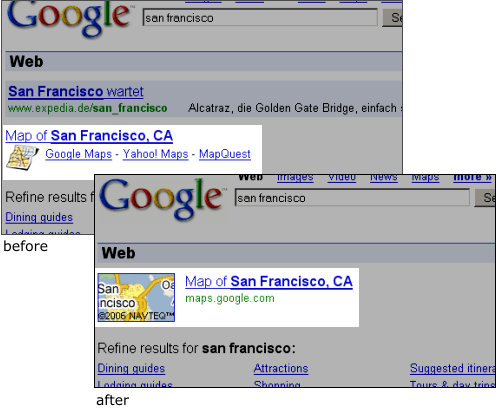Hindsight: Self-Preferencing Behind Google Maps' Rise
In 2007, Google removed links to Mapquest and Yahoo Maps from the top of search results. That was designed to boost Google Maps. It worked.

In January, 2007 Google decided to remove links to Mapquest and Yahoo Maps from the top of search results. This was a momentous decision and I wrote about it at the time for Search Engine Land. It was also the beginning of the end for the Google Maps competitors.
Here's a before and after view of what it looked like at the time:

Loss of Valuable Links
In the 2007 Search Engine Land article I speculated, "The removal of those links from 'generic' searches could impact their traffic in a meaningful way. MapQuest, which is the category leader, has plenty of direct traffic but Yahoo and Google Maps are running neck and neck. And so Yahoo may be the site that suffers most from this move."
Mapquest also suffered. Though the category leader, it failed to keep pace with the mapping feature war happening at the time. Despite being one of its marquee properties, AOL neglected to invest in the site and saw Mapquest's leadership position erode. Google officially surpassed its traffic in 2009. After a decade of decline, Mapquest was ignominiously sold by then owner Verizon Media to System1 in 2019.
In 2010, a year after Google Maps took over the number one spot from Mapquest, Yahoo threw in the competitive towel and began outsourcing its maps to Nokia. This was during the unfortunate Carol Bartz era at Yahoo. As CEO she was mainly a cost cutter and outsourced many of the company's important products to third parties, most notably search (to Microsoft), but also Shopping to PriceGrabber and Real Estate to Zillow. (An example of the destructiveness of short term "Wall Street thinking" on products.)
Blaming Google for Mapquests' Decline
Mapquest insiders later blamed Google's removal of its mapping link for declining traffic. That was largely validated in 2008 by Hitwise’s Heather Hopkins, who argued that Google Maps' growth was based almost exclusively on Google referring search traffic to its own Maps product:
Google sends more of its own traffic to Google Maps than to Mapquest, a change that occurred last March. This can’t really be attributed to an increase in consumers looking for Google Maps. We can measure this through Internet searches. Searches for “google maps” have increased but the term “mapquest” receives nearly 10x the search volume.
The change is that Google is sending more traffic to Google Maps for high volume generic terms and for variations on the Mapquest brand name. Google sent more traffic to Google Maps for searches for “maps” this year compared with the same week last year. The same is true for “driving directions,” “map,” and “directions,” as well as variations on the Mapquest brand name, including “mapquest driving directions” and “map quest.”
Nobody Clicking?
When I asked Google about its rationale for removing links to Yahoo Maps and Mapquest, in 2007, I was told off the record they were being removed because people weren’t clicking on them. Officially Google issued the following statement at the time:
Google is always working to improve search. The redesign of maps onebox better simplifies the Google user experience when looking for business and address information. Users will now be able to obtain directions and store their default location.
Google's official statement was PR speak but its "off the record" remark was probably misleading at best or an outright lie. Google wanted to grow its mapping product and knew that by eliminating competitive links it would do that. In retrospect this was clear self-preferencing and it had a significant impact on competitors' products.
'Because We Can'
A newly surfaced video of Google Search VP Marissa Mayer shows her talking about Google elevating its finance site over competitive sites (e.g., Yahoo Finance) with its primary link position. Google finance launched in 2006; and this video appears to have been recorded before 2007 and the mapping links decision.
Google Finance was placed first in a sequence of competitive finance links, as the company had originally done with maps. The reason Mayer gives is essentially "because we can," implying that the company is entitled to promote its own products ahead of rivals (watch the clip).
🚨BREAKING NEWS: Our legal team has unearthed a video of Google's former VP of Search Products, Marissa Mayer, laughing to Google recruits about preferencing Google owned products in Google Search.
— Chris Pavlovski (@chrispavlovski) June 13, 2024
This will be exhibit 1 in our self-preferencing antitrust lawsuit against Google pic.twitter.com/AGD98yyILx
But Google Maps Is Better
Yes, Google Maps was a stronger product. And perhaps over a longer period of time it would have won anyway. Indeed, AOL was coasting with Mapquest and Yahoo didn't want to keep paying the literal price of the mapping arms race with Google. So the reality is complex.
But it appears pretty clear that Google was self-consciously trying to divert and capture traffic for "generic terms and for variations on the Mapquest brand name" to grow Google Maps. It was using its dominance in search to boost a secondary product (Maps) that was increasingly strategic. And it succeeded.
To say that Google Maps won simply because it was or is the "best product" would be only half the story. Similarly, the reason Google dominates search and paid-search today is partly because of Google search superiority and partly because of what is now seen as anti-competitive behavior (e.g., paying Apple billions for the default search spot on Safari).
Apple Maps is the only real Google Maps competitor today (sorry Bing Maps). Ultimately, the local search market would be better and healthier for both consumers and businesses if there were more mapping sites and local search competitors. But the story isn't black and white: Google is better vs. Google abuse of market power. The truth is somewhere in-between.

